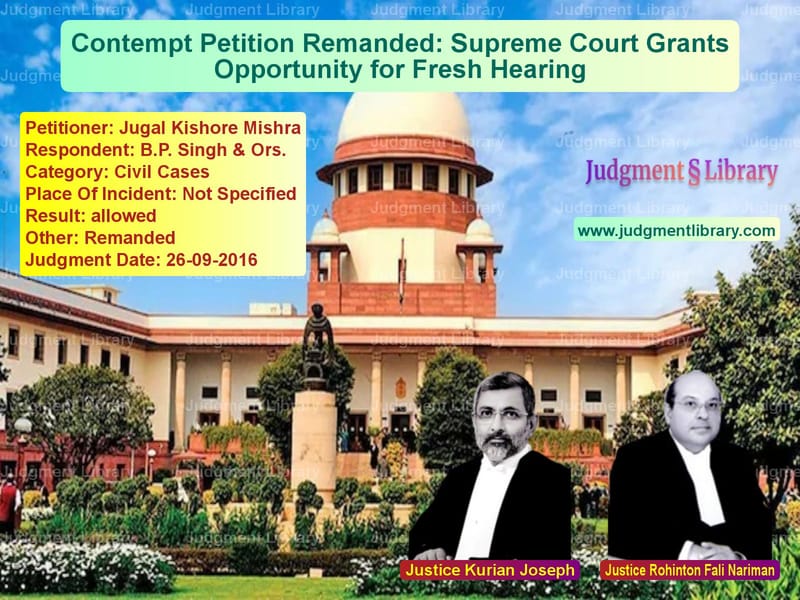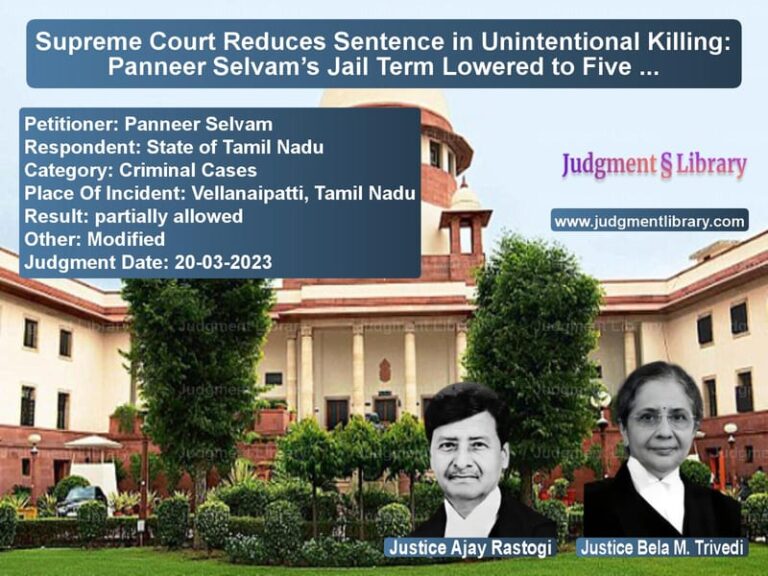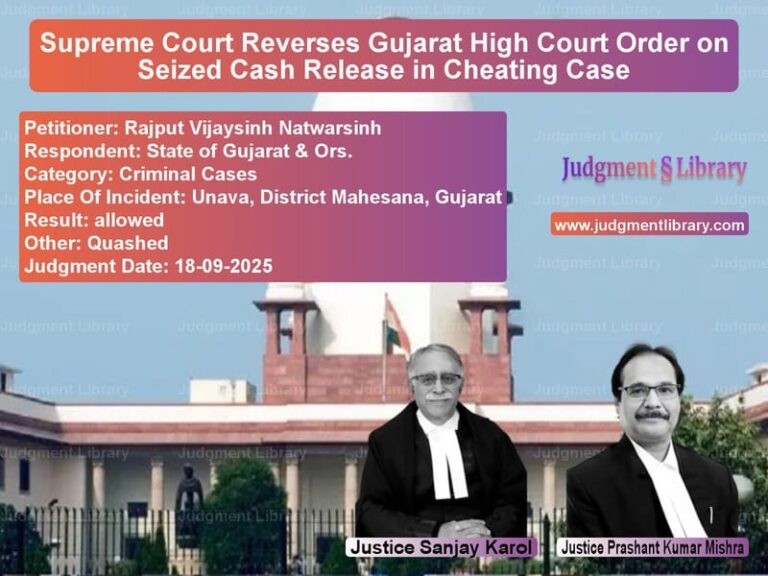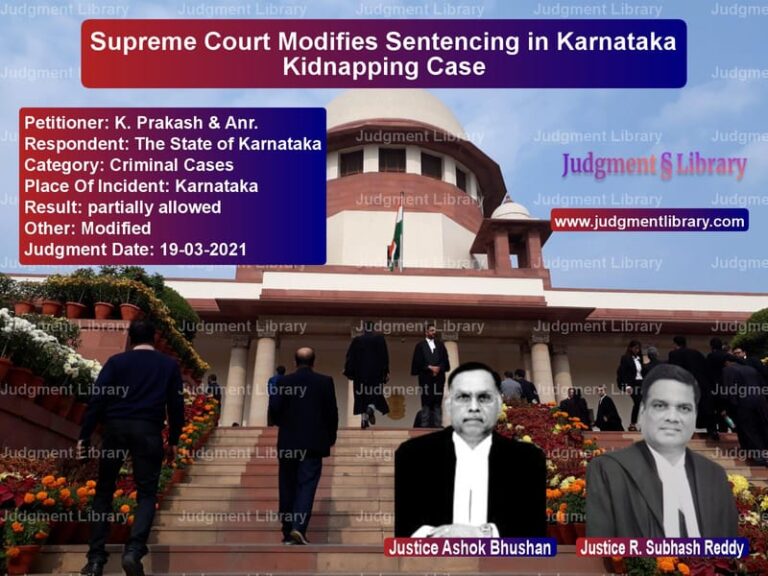Contempt Petition Remanded: Supreme Court Grants Opportunity for Fresh Hearing
The case of Jugal Kishore Mishra v. B.P. Singh & Ors. revolves around a contempt petition filed by the appellant, which was dismissed by the High Court on procedural grounds. The Supreme Court ruled that the appellant should be given another opportunity to present his case on merits, considering his absence before the High Court was unintentional. The judgment highlights the importance of procedural fairness and ensuring that no party is denied the opportunity to be heard.
Background of the Case
Jugal Kishore Mishra filed a contempt petition against B.P. Singh and other respondents, alleging that they had not complied with a previous court order regarding financial benefits. The case initially proceeded in the High Court, where the petition was dismissed because the appellant was not present at the hearing. Additionally, the High Court reviewed the case records and concluded that the appellant was not entitled to financial benefits.
The appellant then approached the Supreme Court, arguing that his absence before the High Court was not deliberate and that he should not be penalized for it. He further contended that if given a chance, he could prove that he was entitled to financial benefits.
Arguments of the Petitioner
Jugal Kishore Mishra presented the following arguments:
- His absence before the High Court was unintentional and should not result in the dismissal of his case.
- The High Court did not allow him an opportunity to present his case, violating principles of natural justice.
- Had he been given a chance to be heard, he could have demonstrated that he was entitled to financial benefits.
Arguments of the Respondent
The respondents, B.P. Singh and others, countered with the following claims:
- The High Court had examined the case records and correctly concluded that the appellant was not entitled to financial benefits.
- The dismissal was justified since the appellant failed to appear despite due notice.
- There was no procedural error in the High Court’s decision.
Supreme Court’s Observations and Judgment
A bench comprising Justices Kurian Joseph and Rohinton Fali Nariman ruled in favor of the appellant, stating that procedural fairness required that he be given an opportunity to present his case before the High Court.
Key Observations
- The appellant’s absence was not a valid reason to dismiss the case when substantial rights were at stake.
- Natural justice mandates that all parties be given a fair chance to be heard.
- The High Court should have decided the matter on merits instead of dismissing it based on non-appearance.
Excerpts from the Judgment
The Supreme Court ruled:
“The interest of justice would be served if one more opportunity is granted to the appellant to make his submission on merits before the High Court so that the High Court can decide the matter on merits having regard to the submissions made by the appellant.”
It further directed:
“We set aside the order dated 19.01.2015 passed by the High Court and remit the matter to the High Court.”
Legal Implications
This ruling clarifies several important legal principles:
- Denying a litigant the opportunity to be heard can make a judgment procedurally invalid.
- Courts must balance procedural compliance with substantive justice.
- Dismissals based solely on technical grounds should be avoided when substantive rights are involved.
Impact of the Judgment
This decision has wide-ranging consequences:
- It reinforces the importance of ensuring all litigants are heard before decisions are made.
- It prevents dismissals based solely on absence when substantive rights are involved.
- It strengthens the doctrine of natural justice in contempt proceedings.
Comparison with Previous Rulings
The Supreme Court has consistently held that procedural fairness is a fundamental principle of the justice system. In cases such as A.K. Kraipak v. Union of India, the Court has emphasized that procedural rules should not override substantive rights. This ruling aligns with previous judgments ensuring that procedural lapses do not deny litigants their rightful claims.
Conclusion
The Supreme Court’s decision in Jugal Kishore Mishra v. B.P. Singh & Ors. ensures that procedural errors do not lead to unjust dismissals. By remanding the case for reconsideration, the Court upheld the fundamental principle that all litigants deserve an opportunity to present their case.
Don’t miss out on the full details! Download the complete judgment in PDF format below and gain valuable insights instantly!
Download Judgment: Jugal Kishore Mishra vs B.P. Singh & Ors. Supreme Court of India Judgment Dated 26-09-2016-1741883903499.pdf
Direct Downlaod Judgment: Direct downlaod this Judgment
See all petitions in Damages and Compensation
See all petitions in Public Sector Employees
See all petitions in Judgment by Kurian Joseph
See all petitions in Judgment by Rohinton Fali Nariman
See all petitions in allowed
See all petitions in Remanded
See all petitions in supreme court of India judgments September 2016
See all petitions in 2016 judgments
See all posts in Civil Cases Category
See all allowed petitions in Civil Cases Category
See all Dismissed petitions in Civil Cases Category
See all partially allowed petitions in Civil Cases Category







